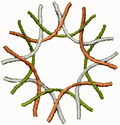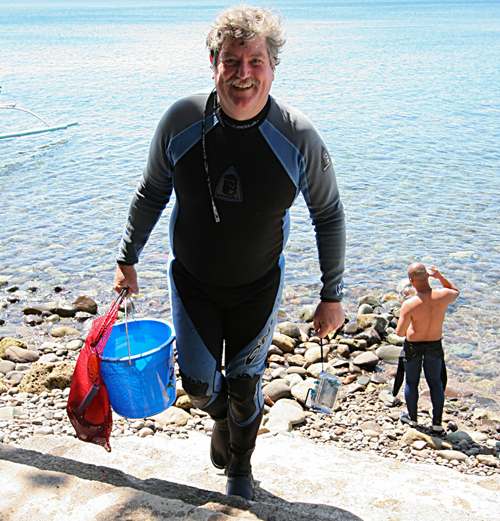|
|

TERRENCE M. GOSLINER
Senior Curator
Department
of Invertebrate Zoology and Geology

A.B. University of California, Berkeley (1972); M.S. University of Hawaii (1973); Ph.D. University of New Hampshire (1978). Curator of Molluscs, South African Museum (1979-82). Post Doctoral Fellow, Smithsonian Institution (1983-84). Assistant Curator, California Academy of Sciences (1982-1985); Associate Curator (1985-1990); Senior Curator (1990- ); Provost (200-2006). Fellow, California Academy of Sciences, Fellow’s Medalist (2008); Fellow, Hennig Society. President, Western Society of Malacologists (1985). President, California Malacozoological Society (1987-); American Malacological Society President (1999-2000). American Association for the Advancement of Science, Pacific Division President (2008).
I have worked at the California Academy of Sciences as a research Curator since 1982 and have published 150 papers in peer-reviewed journals together with four books. I served as Provost and Director of Research where he was responsible for integrating the research, education, exhibit and aquarium functions of the institution. I have had extensive experience developing exhibit concepts, content and designs especially for the new California Academy of Sciences, which opened in Golden Gate Park in September 2008.
My research focuses on the evolution and adaptive radiation of opisthobranch mollusks, especially nudibranchs or sea slugs. I utilize phylogenetic techniques, both morphological and molecular to reconstruct the evolutionary replationships of major groups of opisthobranchs. With these phylogenies I study adaptive radiation, evolution of color patterns and implications to conservation biology. Fundamental studies of opisthobranchs also focus on documenting biodiversity, with a focus on the Coral Triangle of the western Pacific. We have conducted collaborative research in the Philippines since 1992. Approximately 40-60% of the species have been collected from tropical regions are undescribed species and currently members of our lab are describing many of these species within taxonomic revisions. Additionally I have conducted extensive field-work in southern Africa, Madagascar, the Seychelles, Papua New Guinea, Mexico, Costa Rica, the Galápagos Islands and California. My work is supported by NSF to train the next generation of opisthobranch workers and including undergraduates, Masters’ students, Ph.D students and postdoctoral fellows. This work has been supported by several grants from the National Science Foundation, the National Oceanic and Atmospheric Administration and California Sea Grant. I hold adjunct faculty appointments at Stanford, U.C. Santa Cruz and San Francisco State University.
Selected Publications:
Gosliner, T.M. and M.T. Ghiselin. 1984. Parallel evolution in opisthobranch gastropods and its implications for phylogenetic methodology. Systematic Zoology 33:255-274.
Gosliner, T.M. 1987. Nudibranchs of Southern Africa. A Guide to the Opisthobranch Molluscs of Southern Africa. Sea Challengers, Monterey, 136 pp.
Gosliner, T. M., D. W. Behrens and G. C. Williams 1996. Coral Reef Animals of the Indo-Pacific, Animal life from Africa to Hawai'i exclusive of the vertebrates. Monterey: Sea Challengers, 315 pp.
Gosliner, T. M., D. W. Behrens and Á. Valdés 2008. Indo-Pacific nudibranchs and sea slugs: a field guide to the World’s most diverse fauna. Sea Challengers/California Academy of Sciences: Gig Harbor/San Francisco, 426 pp.
Pola, M., J. L. Cervera and Terrence M. Gosliner 2007. Phylogenetic relationships of Nembrothinae (Mollusca: Doridacea: Polyceridae) inferred from morphology and mitochondrial DNA. Molecular Phylogenetics and Evolution 43:726-742.
Malaquias, M., J. Mackenzie-Dodds, T. M. Gosliner, P. Bouchet and D. G. Reid 2009. A molecular phylogeny of the Cephalaspidea sensu lato (Gastropoda: Euthyneura): Architectibranchia redefined and Runcinacea reinstated. Zoologica Scripta 38: 23-31.
Career Publications
California Academy of Sciences |


